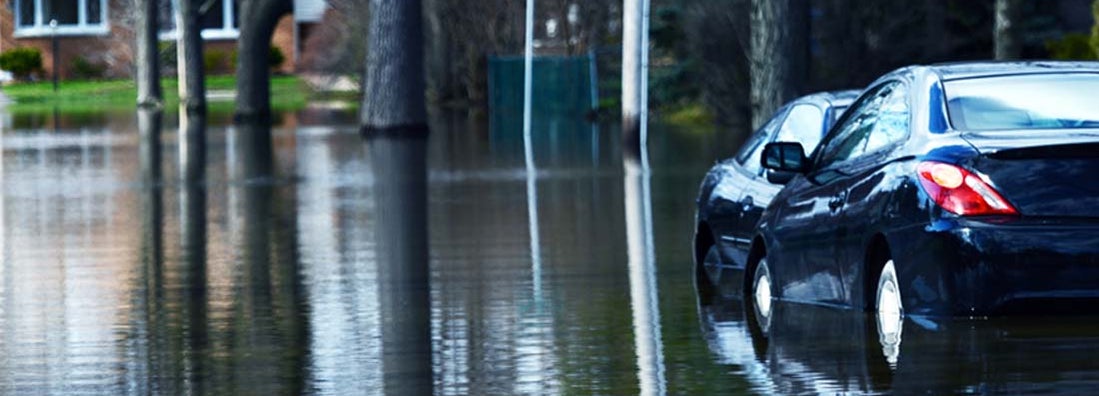Car Insurance: Steps After a Flood
(And how you can find the right protection)

Immersion in water can be far more damaging to your car than the average person might think.
“But it’s just water. Dry it out thoroughly and it should be okay, right?”
The short answer to that is no, it probably won’t be okay. Immersion in water deeper than the axles can wreak havoc on a car, especially the electrical systems, interior, engine, and transmission.
Water will short out electronics, cause mold to grow in the interior ventilation system and carpets, and damage other components by contaminating oil, brake fluid, and transmission fluid, and by corroding and rusting engine components.
Salt water in particular is even more damaging for two reasons. The first is because the salt causes rapid corrosion of metal parts, and the second is because it’s a much better conductor of electricity than fresh water, which means it will short out electronics more readily.
In general, if your car has been immersed in water deep enough to reach the interior, it’s likely your car has been severely damaged even if that damage isn’t readily apparent at first.
Our independent insurance agent matching tool will find you the best insurance solution in your area. Tell us what you're looking for and we'll recommend the best agents for you. Any information you provide will only be sent to the agent you pick.
So what should I do first?
The Five Things to Do after Your Car Is Flooded
1. Do not start the car. If there is water in the engine or the electronics, attempting to start it could damage it further, possibly beyond repair. Don’t even turn the key in order to raise the windows because that will energize the electronics. And if they’re wet, short circuits and damage will occur.
If the windows are down and the car is unprotected from rain, cover it with a tarp instead. It’s possible your car can be restored to its former condition, but let the experts determine that before you cause more damage.
2. Document the damage. Take photos of your car and the damage. Take many photos, do it in good lighting, and get close-ups. Make sure to get photos showing the waterline left by mud and debris to demonstrate how high the water rose.
This will help ensure that you’re able to recover the full insurance proceeds available to you, and it will support tax write-offs for any uninsured losses.
3. Contact your insurance agent. Do this as soon as possible. Flood damage is usually covered by your comprehensive coverage even if you don’t carry collision insurance.
4. File the claim. You will need to contact the insurance company that carries your auto insurance to do this, but your agent can help. Be prepared with your policy number, the incident report number from the police or fire department if there is one, the exact details of when it happened and where, the vehicle registration information, and details of any lease or financing on the car.
5. Work with the insurance company. A claims adjuster will probably need to see the vehicle, so leave it as is until they’ve had a chance to inspect it. You can remove personal items but leave everything else exactly as you found it. The adjuster will probably take more photos of their own and will want to inspect the photos and documents you have.
Record everything throughout this process. Keep copies of bids and estimates, repairs made, notes about discussions with the insurance company, and photos of damage and repairs in progress.
If the adjuster determines that the water reached the level of your dashboard, the insurance company will probably declare your car “totaled.” That means they’re going to pay you the market value of the vehicle (minus your deductible) rather than attempting to repair it.
Keep in mind that what the insurance company offers you to settle your claim is only an offer. You can negotiate and don’t have to accept it.
This is another good reason to use an independent insurance agent. They can help you decide if the insurance company’s offer is reasonable and how to respond if you don’t think it is.
Why Choose an Independent Insurance Agent?
Our vast network of independent insurance agents can provide you with a large selection of automobile policies that will provide you with the security you need to deal with any calamity, including floods.
Independent insurance agents simplify the process of shopping for and comparing auto insurance. They will explain the complex terms for you, cut through the jargon, and make sure you understand the fine print.
But perhaps most importantly, they work for you — not one insurance company. They can compare policies from many companies and pick the ones that are best for you at the best possible price.
They’ll also be there for you in the future if your needs change or questions arise. They work for you, and their only job is keeping you satisfied now and in the future.
©2023, Consumer Agent Portal, LLC. All rights reserved.
https://www.liveabout.com/what-to-do-if-your-car-is-flooded-4171661
https://www.statefarm.com/simple-insights/auto-and-vehicles/what-to-do-if-your-car-has-flood-damage